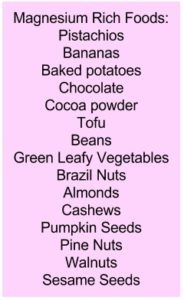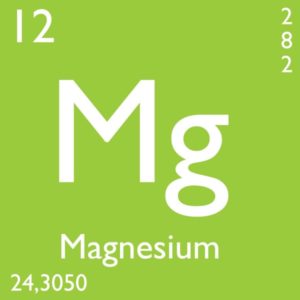I’ve written about magnesium often. It’s something which comes up a lot in conversations with my friends. Because of this I feel it’s important to devote another article to the topic.
Magnesium is probably the most important mineral you can take. And most people are deficient. In fact, it’s estimated that 80% of the population is lacking magnesium.
There are dozens of symptoms that could indicate a magnesium deficiency. But let’s first look at possible reasons:
- Taking calcium supplements.
- Regular pot smoking.
- Cigarette smoking.
- Consuming a lot of sugar.
- Excessive alcohol consumption.
- Leaky gut or Crohn’s Disease.
- Menopause or taking HRT.
- Getting older.
- Taking certain medications like antacids, acid blockers, diuretics, blood pressure medicine, antibiotics, corticosteroids, asthma medication, chemotherapy drugs and insulin.
- Constant stress.
- Consuming large amounts of calcium (cheese, raw milk, broccoli, kale, sardines, yogurt).
- Lack of magnesium in our soil which depletes the magnesium in our food and the food animals eat.
- Consuming refined processed foods.
- Just having major surgery.
Magnesium is responsible for over 300 biochemical reactions in the body and allows enzymes to function properly.
Enzymes are necessary for the body to break down sugars in the digestive system. But enzymes don’t function alone. They need enzyme co-factors. Magnesium is the most common co-factor and critical to glucose and fat breakdown, the regulation of cholesterol production and the production of proteins and antioxidants.
Magnesium is necessary for energy production. It’s essential for healthy bone formation. It works to regulate blood pressure and maintain a healthy heart.
Now fixing a magnesium deficiency is easy. But trying to find out if you are low isn’t so easy.
You see, magnesium is stored in your bones and organs. Only 1% of magnesium is found in your blood so that makes a blood test useless in detection. This is why magnesium deficiency is often overlooked. And it’s frightening because being deficient in magnesium can trigger many medical conditions.
Here are signs of deficiency and diseases that can stem from low magnesium:
- Abnormal heart rhythms
- ADHD
- Anger
- Anxiety
- Arteriosclerosis
- Asthma
- Blood clots
- Bowel disease
- Calcium deficiency
- Cardiac infarction
- Chronic Back Pain
- Chronic fatigue syndrome
- Cluster headache
- Constipation
- Cystitis and bladder spasms
- Depression
- Diabetes
- Elevated C-reactive protein
- Eye twitches
- Fatigue
- Fibromyalgia
- Heart disease
- Heart Palpitations
- Hypertension or high blood pressure
- Hypoglycemia
- Infertility
- Insomnia
- Irritability
- Kidney disease
- Kidney stones
- Low blood pressure
- Memory problems
- Menstrual pain and cramps
- Migraine
- Muscle aches and spasms
- Osteoporosis
- Panic attacks
- Polycystic ovarian disease
- Personality changes
- Potassium deficiency
- PMS
- Raynaud’s syndrome
- Restless leg syndrome
- Sleep disorders
- Stroke
- Tendonitis
- Tinnitus
- Tremor of the hands
- Tooth decay
The list is pretty long and I’m sure I’ve missed some. But if you are checking off a few of these you should probably start increasing your magnesium.
The body doesn’t make magnesium so you have to get it in your diet and/or supplement.
Getting enough magnesium in your diet can be tough. Our food has become depleted. So if you eat lots of  magnesium-rich foods and still feel symptoms, then adding an oral supplement or an oil may be all you need to feel better.
magnesium-rich foods and still feel symptoms, then adding an oral supplement or an oil may be all you need to feel better.
The most recommended absorbable forms of magnesium are: citrate, glycinate, aspartate.
Most people need between 400-1000mg. Start slow and if you get diarrhea cut back.
You have to experiment, but you can find the right dose for you. It’s safe for almost everyone. But if you have heart or kidney disease, speak with your doctor before taking magnesium.
Correcting your deficiency can help to prevent chronic illness and keep your metabolism running smoothly. And it’s very possible that magnesium could be the key to wellness.
Let me know if you decide to increase your magnesium and how it’s going. I love hearing your stories … it keeps me motivated :).
To a healthy more beautiful you!
Sandy DeRose
P.S. For the convenience of my readers, I’ve recently added a great magnesium product to my arsenal of supplements. Check it out here.
References:
Dierck-Hartmut Liebscher, MD., Et. al. About the Misdiagnosis of Magnesium Deficiency. Journal of the American College of Nutrition. 2004.
Klinikum Coburg, III., Et. al. Magnesium basics. CKJ Clinical Kidney Journal. 2012.
King DE., Et. al. Dietary magnesium and C-reactive protein levels. Journal Of The American College Of Nutrition. 2005.
Dean C. The Magnesium Miracle. New York: Ballantine Books. 2007.
Cunha AR., Et. al. Oral magnesium supplementation improves endothelial function and attenuates subclinical atherosclerosis in thiazide-treated hypertensive women. Journal of Hypertension. October 2016.
Weiss GH., Et. al. Changes in urinary magnesium, citrate and oxalate levels due to cola consumption. Urology. 1992.
Bernstein A., Et. al. Nutrition for the Older Adult. Sudbury, MA: Jones and Bartlett Publishers. 2010.
Pressman A. Vitamins and Minerals. New York: Alpha Books. 2007.
Dou M., Et. al. Combined chromium and magnesium decreases insulin resistance more effectively than either alone. Asia Pac J Clin Nutr. December 2016.
Fox C., Et. al. Magnesium: Its Proven and Potential Clinical Significance. Southern Medical Journal. 2001.
Bendich A. The potential for dietary supplements to reduce premenstrual syndrome (PMS) symptoms. J Am Coll Nutr. 2000.
Demirkaya S., Et. al. Efficacy of intravenous magnesium sulfate in the treatment of acute migraine attacks. Headache. 2001.
Eby GA., Et. al. Magnesium for treatment-resistant depression: a review and hypothesis. Med Hypothesis. 2010.
Guerrera MP., Et. al. Therapeutic uses of magnesium. Am Fam Physician. 2009.
Guerrero-Romero F., Et. al. The effect of lowering blood pressure by magnesium supplementation in diabetic hypertensive adults with low serum magnesium levels: a randomized, double-blind, placebo-controlled clinical trial. J Hum Hypertens. 2009.
Mathers TW., Et. al. Oral magnesium supplementation in adults with coronary heart disease or coronary heart disease risk. J Am Acad Nurse Pract. 2009.
Mauskop A. Alternative therapies in headache. Is there a role? Med Clin North Am. 2001.
Orchard TS., Et al. Magnesium intake, bone mineral density, and fractures: results from the Women’s Health Initiative Observational Study. Am J Clin Nutr. 2014.
